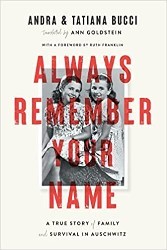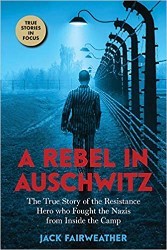One of the occupational hazards for scholars of modern German politics is their abundant, perhaps even overwhelming, exposure to all things related to Nazis, Hitler, and the Holocaust. Being the only child of a Romanian-born, Hungarian-speaking, Holocaust-ravaged, middle-class Jewish family, I had a preoccupation with this topic well before becoming a scholar; it is safe to say that as a seventy-three-year old university professor specializing in German and European politics, I am reasonably acquainted with this unique event in human history. This pertains not only to the macro-level scholarship in English and German devoted to analyzing this epoch’s political systems, governing regimes, economic relations, and rivaling ideologies, but also to many micro-level accounts of personal tragedies. So what could yet another personal story tell me about this nightmare? What more is there to tell, to know?
Lily Ebert’s powerful book demonstrates solidly that there is plenty. The author’s ability to offer stunning details lend this book its intellectual gravitas but also its readability. From the very beginning of Lily’s life in the small south Hungarian town of Bonyhád, where one in eight of the seven thousand inhabitants was Jewish in December 1923, when Lily was born as the eldest of six children to the typically middle class Jewish family of the Engelmans, details in the description of everyday life offer immense richness. The author succeeds in depicting Jewish life in Bonyhád in all its facets.
True to the form of the Jewish bourgeoisie in Hungary at this time, the Engelmans honed their German in speech and reading, never bothering to learn Yiddish. Striking in this thick description of Jewish life in this Hungarian provincial town is the total absence of antisemitism. “I’m not sure we even knew there was such a thing as antisemitism when we were very young. It would have seemed a ridiculous idea.” Lily lives in a cocoon that appears to be utterly incredible in hindsight but was very real for her. It is all the more jarring to read Ebert’s account of the sudden demolition of this nirvana in a matter of a few days in May of 1944, when her world comes tumbling down in an orgy of antisemitism that results in Lily, her siblings, and mother being transported in a cattle car to Auschwitz in early July.
Ebert’s description of the unspeakable inhumanity of the train ride remains unforgettable. Likewise, her time in Auschwitz, followed by a stint in a munitions factory in Altenburg, capped by a death march leading her to unexpected freedom, highlights Ebert’s fine ability to depict the sheer incredulity during this nightmare. Even though all these chapters feature a singular brutality and inhumanity, Ebert — to her great credit — writes with zero self-pity. Coming full circle to the bliss of family life that commences this book, Lily Ebert’s London-based great grandson, Dov Forman, authored three chapters. In these, Forman depicts how his social media prowess helped Lily find the son of her most important American liberator, Hyman Schulman, who was then an assistant to Rabbi Herschel Schacter chaplain in the United States Army, father of Jacob Schacter, eminent professor of Jewish History and Thought at Yeshiva University. But, more significantly, Dov’s mastery of the Internet’s many platforms and youthful verve have given Lily an added zest for life and a sense of family that she actually never lost, despite the horrors that she encountered.
Andrei S. Markovits is the Karl W. Deutsch Collegiate Professor of Comparative Politics and German Studies at the University of Michigan. His books, articles and reviews on various aspects of German and European politics have appeared in 15 languages. Markovits’s latest work is a memoir entitled The Passport as Home: Comfort in Rootlessness published by the Central European University Press in 2021.



